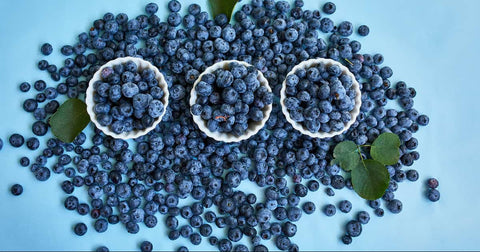Blueberries, those tiny blue gems packed with antioxidants and flavor, are a popular snack and a healthy addition to any diet. But beyond their nutritional benefits, you might be wondering about their impact on your digestive system. Specifically, do blueberries make you poop?
If you're a woman who enjoys blueberries but experiences digestive changes after eating them, this article will explore the connection between blueberries and bowel movements, offering insights into their fiber content, potential side effects, and how to optimize your gut health.

Do Blueberries Make You Poop? The Fiber Factor
Yes, blueberries can contribute to regular bowel movements. This is primarily due to their fiber content. Fiber is a type of carbohydrate that your body can't digest. It adds bulk to your stool and helps it move through your digestive system more easily, preventing constipation.
Fiber in Blueberries: A Closer Look
One cup of blueberries contains about 3.6 grams of fiber, which is approximately 10% of the recommended daily intake for women. This fiber, combined with other compounds in blueberries, can contribute to their potential laxative effect.
Can Blueberries Cause Diarrhea?
While blueberries are generally good for digestion, consuming a large amount might lead to loose stools or diarrhea in some individuals. This is because:

-
High Fiber Content: Excessive fiber intake can sometimes overwhelm the digestive system, especially if you're not used to a high-fiber diet.
-
Fructose: Blueberries contain fructose, a natural sugar that can cause diarrhea in people with fructose malabsorption.
-
Salicylates: Blueberries contain salicylates, natural compounds found in many fruits and vegetables. Some individuals are sensitive to salicylates and might experience diarrhea after consuming them.
Can You Eat Too Many Blueberries?
While blueberries are nutritious, it's best to enjoy them in moderation. Excessive consumption can lead to digestive upset, including:
-
Bloating and Gas: The fiber in blueberries can be fermented by gut bacteria, producing gas.
-
Diarrhea: As mentioned earlier, large amounts of blueberries can trigger diarrhea in some individuals.
What Happens if You Eat Blueberries Every Day?
Eating blueberries every day can be a healthy addition to your diet, providing antioxidants, vitamins, and fiber. However, it's essential to be mindful of your portion sizes and listen to your body's signals. If you experience any digestive discomfort, adjust your intake accordingly.
Food Intolerance and Digestive Health
If you experience persistent digestive issues, including diarrhea, after eating blueberries or other foods, consider the possibility of a food intolerance or sensitivity.
A food sensitivity test kit can help you identify specific foods that might be triggering your symptoms. By eliminating or reducing these trigger foods, you can potentially alleviate your digestive problems and improve your overall gut health.

Key Takeaways:
-
Blueberries can contribute to regular bowel movements due to their fiber content.
-
Excessive blueberry consumption might cause gas or diarrhea in some individuals.
-
If you experience persistent digestive issues, consider a food sensitivity test to identify potential food intolerances.
Remember, this article is intended for informational purposes only and should not be considered a substitute for professional medical advice. If you have any concerns about your digestive health, consult a qualified healthcare professional.
Frequently Asked Questions:
1. Are all types of blueberries equally likely to cause digestive issues?
Generally, different blueberry varieties have similar effects on digestion. However, some people might find that wild blueberries, which are smaller and have a higher skin-to-flesh ratio, cause more gas or bloating due to their higher fiber content.
2. Can I drink blueberry juice to help with constipation?
Yes, blueberry juice can also be beneficial for constipation, but it's important to choose 100% blueberry juice without added sugars. Keep in mind that juice might not contain as much fiber as whole blueberries.
3. How can I incorporate more blueberries into my diet without experiencing digestive problems?
Start with small portions of blueberries and gradually increase your intake as your body adjusts. Pair them with other foods, such as yogurt or oatmeal, to slow down digestion and reduce the likelihood of gas or bloating.
4. I have irritable bowel syndrome (IBS). Can I still eat blueberries?
Blueberries are generally considered low FODMAP in moderate amounts, which means they're usually well-tolerated by people with IBS. However, individual tolerance can vary, so it's best to start with a small portion and monitor your body's response.
5. I'm experiencing digestive issues after eating blueberries, but I don't think it's related to fiber. Could it be something else?
Yes, it's possible to have a food intolerance or sensitivity to blueberries, even if you don't experience typical symptoms like diarrhea. Consider a food sensitivity test to identify potential triggers and manage your symptoms effectively.


.png?v=1737390083)
.png?v=1737187409)


